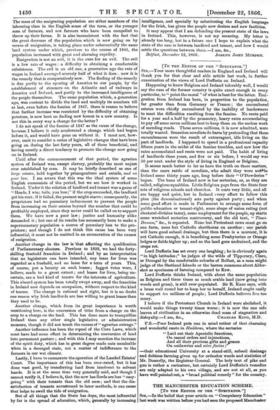[To THE EDITOR OF THE " SPE CTATOR.1 SIR, —Your
more thoughtful readers in England and Ireland will thank you for that clear and able article last week, in further examination of the views of Lord Dcifferin on Ireland.
Happening to know Belgium and Ireland tolerably well, I would say the case of the former country is quite exact enough in every particular, to " point the moral " of what is best for the latter. Emi- gration from Ireland has been, in proportion to the population, far greater than from Germany or France ; the encumbered estates were chiefly encumbered by the inability of landowners to meet the difficulties resulting from the famine. No rents paid for a year and a half by the peasantry, heavy rates accumulating to pay off some seven millions lent to keep them on the useless work of mending roads. These seven millions, it is now admitted, were totally wasted. Sensation novelists do harm by pretending that these encumbrances were the result of extravagant, idle living on the part of landlords. I happened to spend in a professional capacity fifteen years in the midst of the famine troubles, and saw how the rates accumulated and rents were not paid. The habit of living of landlords these years, and five or six before, I would say was 50 per cent. under the style of living in England or Belgium.
It seems much better to let us have the truth on these matters, than the mere rattle of novelists, who admit they were notc-in Ireland some thirty years ago, long before their " O'Dowderies " began. The bane of Ireland now is her sectarian, or, as they are called, religious squabbles. Little Belgium pays from the State four sets of religious schools and churches. It costs very little, and all are happy and quiet, but in Ireland every effort to follow this plan (the denominational) sets party against party ; and when some good effort is made in Parliament to arrange some form of public education or tenant-right, some shape of union rating (not electoral-division taxes), some employment for the people, up starts some wretched sectarian controversy, and the old text, " Timeo Danaos," &c., is repeated. None but Protestant cows must go on one farm, none but Catholic shorthorns on another ; one parish will have good subsoil drainage, but then there is a murmur, it Is not Catholic enough, it is benefiting some Presbyterian or Orange lodges or fields higher up; and so the land goes =drained, and the crops rot.
Lord Dufferin has set every one laughing ; be is obviously again "in high latitudes ;" he judges of the wilds of npperary, Clare, or Donegal by the comfortable suburbs of Belfast, as a man might judge of the Shetland Islands or the barren commons about Alder- shot as specimens of farming compared to Kew.
Lord Dufferin thinks Ireland, with about the same population as Belgium and three times as much arable land (now going into weeds and grass), is still over-populated. Sir R. Kane says, with a brass wall round her to keep her to herself, Ireland ought easily to support ten millions of people ; Lord Dufferin believes five too many.
I believe if the Protestant Church in Ireland were abolished, it would make things twenty times worse ; it is now the one safe leaven of civilization in an otherwise dead mass of stagnation and
P.S.—Poor Ireland puts one in mind rather of that charming and wonderful canto in Hudibras, where the sectaries
" Laid out their Apostolic functions, On casual orders and injunctions, And all their precious gifts and graces
On outlawries and scire facias ;"
—their educational University at a stand-still, subsoil drainage and dubious farming given up for orthodox weeds and statistics of Mr. Donnelly, the Registrar-General. The holy text of pike and gun is rather a caricature, but certainly Lord Dufferin's remedies are only adapted to his own village, and are not at all, as you have well pointed out, a "broad political remedy" for the country.


































 Previous page
Previous page